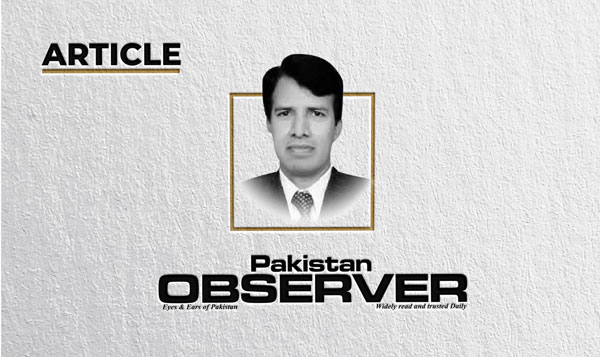National security and economic sovereignty
IN its two significant meetings, the National Security Committee (NSC) of Pakistan was able to establish an essential relationship between security and economy; “national security hinges on economic sovereignty.
” NSC debated the challenges, facing the state and society of Pakistan and also decided to take measures to overcome the challenges.
In the wake of a rapidly resurging wave of terrorism arising from western borders, the forum was expected to pay attention to issues of national security, nevertheless, the wisdom prevailed and economy was thoroughly deliberated alongside the security.
Indeed, national security cannot be separated from the economy. NSC concluded, “national security revolves around economic security and that sovereignty or dignity comes under stress without self-sufficiency and economic independence”.
This is the perfect theme; NSC considered the debate and tried to find a way forward. Soon after the meetings of NSC the Army Chief General Asim Muneer undertook two significant visits: Kingdom of Saudi Arabia and United Arab Emirates (UAE).
The outcomes of these visits is yet to be known, however, there are tangible and positive indicators with regards to the visit of Army Chief.
Besides, the Prime Minister and his team visited Geneva to attend International Conference on Climate Resistant Pakistan, indeed a donor’s conference.
The Prime Minister and his team was able to attract the attention of international donors who promised to assists Pakistan for reconstruction and rehabilitation of flood-affected people.
In the conference, international donors pledge for provision of over $10.57 billion at multilateral and bilateral levels of creditors for reconstruction of flood-affected areas.
It is a welcoming step. Besides the impacts of the flood, Pakistan’s economy is in a dire-straits with very low foreign reserves.
Essential goods and eatables are so expensive that people cannot afford to purchase. The inflation is at its highest and Pakistani Rupee is continuously plummeting.
The industrial sector of Pakistan is struggling to operate with many large companies partially suspending their work.
Indeed, Pakistan is facing all sorts of challenges to its survival and political forces are fighting to gain the powers.
After attending his first meeting of the NSC, Chief of Army Staff (COAS) General Asim Muneer had to say, “Pakistan is passing through one of her most critical junctures and this requires the development of national consensus by all stakeholders to sail through the confronted challenges of economy and terrorism.”
Since the NSC has been able to establish a relationship between security and economy, the return of terrorism and a media campaign against the Pakistani economy has many connotations.
Assessing the economic indicators of Pakistan, the country is ranked 34th among 39 countries in the Asia–Pacific region.
Indeed, this positioning is very low and overall economic score of Pakistan is below the regional and world averages.
Besides, Pakistan’s external “debt rose from $34b in 2021 to $38b in 2022 and is expected to rise to $40b in 2023.
” Economy of Pakistan started slowing down in 2019 and reached its lowest ebb in 2022. The economic freedom score of Pakistan is 48.8, grading its economy as 153rd freest in the 2022 Index.
Pakistan is facing extreme economic crises of its history and there is an immediate need to take measures for saving the country from economic default.
The external debt of Pakistan has increased manifolds and its currency is trading at the lowest rate against US dollar (1USD=240 PKR).
IMF and other financial institutions are imposing very tough conditions for the loan facility, agreed with previous Government of Imran Khan.
In a way the economic crisis of Pakistan are getting deeper and deeper with each passing day.
Despite being an agrarian economy, the essential food items are rapidly getting out of the reach for over 70% Pakistani masses.
Inflation is record high and the developmental sector is found wanting in all areas of socio-economic development of the state.
Budget of all developmental sectors of Pakistan has been reduced to minimum whereas non-developmental expenditure is increasing with each passing day.
Indeed, not the resources but the poor economic management is considered to the real cause of deteriorating economy of Pakistan and downward trends in the living standards of over 230 million Pakistanis.
While the national economy of Pakistan is sliding downwards, there has been unprecedented mushroom growth of various cartels in Pakistan.
These cartels are controlling the prices and supply of almost all critical food items and petroleum with or without consent of the government.
The successive governments have become hostage to these internal and external cartels. Currently, the economic management of the state is being run through heavy and agonizing taxation system on poor masses which cannot be sustained long-term.
The economic management of nuclear Pakistan with rivalries all around and multiple fault lines within cannot be run like a corporate company nor can it be left at the mercy of cartel-driven economic managers.
The significance of economy can be imagined from a famous quote, “Economy is the start and end of everything” for every sovereign state.
Unfortunately, despite heavy taxes and exceptionally high levies on all goods and utilities, economy of the state is falling down with each passing day.
The way forward is: A massive restructuring of the economic management of Pakistan through serious, innovative and revolutionary steps where foreign economic dependence needs to be minimized.
The non-developmental expenditure must be reduced substantially while imposing a ban over the luxuries of government officials, elite class and bureaucracy.
The political parties must end their conflicts, since political stability is essential step for economic prosperity.
At the level of Federal Government, let’s have a think-tanks level debate to give concrete and workable recommendations for the attainment of economic sovereignty as perceived during NSC meeting held on 2 January 2023, “national security hinges on economic sovereignty. ”
— The writer is Professor of Politics and IR at International Islamic University, Islamabad.










